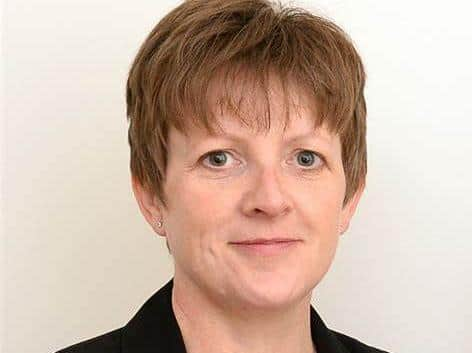Milton Keynes mum of two sons with lung disease is awarded British Empire Medal for work with respiratory charity
and live on Freeview channel 276
Fiona Copeland from Wavendon Gate was recognised for her "tireless" work with respiratory charity Primary Ciliary Dyskinesia (PCD) Family Support
Group.
She chaired the PCD Family Support Group on an entirely voluntary basis until June 2020 for nearly 17 years, transforming it into the professional and well-regarded organisation it is today.
Advertisement
Hide AdAdvertisement
Hide Ad

The charity offers a range of support to individuals and families affected by PCD, as well as information to medics and the clinical community.
Fiona’s work has involved providing constant telephone and in-person support to individuals and families affected by PCD, providing them with information, reassurance and help when they need it. She has transformed the care of PCD patients across the UK and even globally, assisting international PCD charities with help and advice.
PCD or Primary Ciliary Dyskinesia is a rare genetic condition affecting one in 10,000 peoplein the UK. It is associated with the abnormality of cilia (microscopic hairs that beat in the airways, sweeping secretions out of the respiratory tract) and can affect the lungs, nose, sinuses, ears and fertility. If left untreated can lead to a form of lung damage known as a ‘bronchiectasis’.
Fiona’s sons Euan and Gregor were diagnosed with PCD when they were aged six and four after being wrongly diagnosed with asthma. Unfortunately, by the time the correct diagnosis came the boys both had irreversible lung damage.
Advertisement
Hide AdAdvertisement
Hide AdFrom this personal experience Fiona was keen to get more awareness of PCD to the wider medical community so other families would be able to get the appropriate diagnosis and care as soon as possible. It was her drive and determination that brought the leading experts and practitioners from different medical fields togethr to discuss this rare genetic respiratory condition in a new forum, establishing a common agenda to help tackle and alleviate the impacts of this condition.
The ability to get key people around the table is one of Fiona’s strongest attributes, and she worked tirelessly to attain funding from the NHS commissioners for a national PCD paediatric service across England Wales (established in 2006). As a result, there are now specialist centres across England who are well-equipped with the specialist resources to deliver an effective in-house and outreach service to young patients.
Most recently, Fiona lobbied for the funding of an adult service for PCD. Even when the case looked bleak and funding looked unlikely, Fiona did not give up on applying pressure to the NHS commissioners to set up this vital service. On Monday 18th December 2017 the NHS granted funding for the new adult service,.
This could not have come at a more important time, with the entire adult PCD community being considered Clinically Extremely Vulnerable’ during the current Covid-19 pandemic. Fiona quickly mobilised the medical professionals in March 2020, to ensure that patients with PCD were kept up to date with guidance about the developing crisis, thus providing them with the information and support they needed to keep safe.
Advertisement
Hide AdAdvertisement
Hide AdFiona has been the 'glue' between the PCD community and the medical world.Internationally, she has helped organisations in Portugal, France and Australia to develop their own patient support groups and she has had a profound impact across a vast array of networks relating to genetics and rare diseases.
A spokesman for the charity said: "This national honour at the end of a very difficult year is richly deserved and the PCD community are infinitely grateful to her for all of her dedicated service."
Fiona said: “I am delighted to accept this award – I have really enjoyed volunteering for the PCD Family Support Group and being able to help improve the diagnosis and management of PCD patients in the UK. I am also very pleased that by receiving this award it can in some small way help raise even more awareness of this rare condition”.